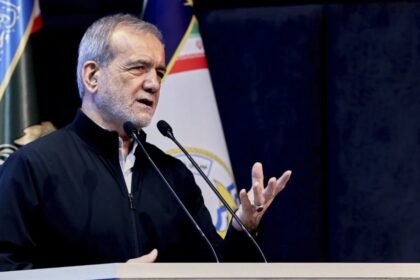Even as Elon Musk and Donald Trump dominated headlines by publicly feuding on social media, the newly appointed FBI Director, Kash Patel, appeared on the Joe Rogan podcast for his first long-form interview. The conversation, over two hours long, ranged across familiar territory—government dysfunction, national security, and internet conspiracy—but the most striking element was Patel’s claim that the United States was not just facing a public health crisis from fentanyl. It was, in his words, “chemical warfare.”Patel, a former national security official under Trump and the first Indian-American to lead the FBI, framed the fentanyl epidemic not as a policing issue, but as a global, coordinated attack on American infrastructure—social, generational, and institutional. With over 100,000 overdose deaths in 2024, and fentanyl now the leading cause of death for Americans aged 18 to 45, Patel argued that this is no longer about addiction. “You don’t hear about fentanyl deaths in China, India, or England,” he told Rogan. “That’s not an accident.”His central claim is this: the chemicals used to make fentanyl are manufactured in China, trafficked through third-party countries including India and Canada, and assembled by Mexican cartels. The final product—often disguised as prescription pills or even candy—enters the US through its borders and postal system. Patel calls this “tier-one national security,” positioning it on par with terrorism or nuclear proliferation.
A Structural Rot in the FBI
Patel took office in February 2025, after being nominated by President Trump in his second term. One of his first internal discoveries was that nearly a third of the FBI’s 35,000 employees—more than 11,000—were stationed in the Washington, D.C. metropolitan area. “Crime doesn’t concentrate in D.C.,” he told Rogan. “Our people were there not because they needed to be operationally, but because promotions required proximity to headquarters.”Within his first 100 days, Patel moved over 1,500 agents out of Washington to field offices across the country. In his view, violent crime, fentanyl distribution, and cartel activity required a different kind of organisational posture—more agents embedded in localities and fewer in administrative clusters.The Bureau, he said, had become accustomed to paper-pushing, inter-agency briefings, and national press strategy. It was, in his words, “a bureaucracy that served itself.” He did not blame the rank-and-file agents. His criticism was aimed squarely at leadership and structural incentives that encouraged ambition over impact.
The Chemical Trail: From China to Mexico
The fentanyl story, as laid out by Patel, begins in China. While China has publicly banned the export of fentanyl, Patel argues that Chinese chemical firms have instead focused on exporting precursor chemicals—substances used to synthesize fentanyl. These are often shipped under the guise of legitimate pharmaceutical or industrial use. China, he says, understands how to exploit technicalities and regulatory blind spots.Mexican cartels then use these ingredients to manufacture illicit fentanyl, which is pressed into counterfeit pills—often mimicking common painkillers like oxycodone—or mixed into other drugs. These pills are sometimes manufactured in colours and shapes resembling candy, making them especially dangerous to young users.Patel did not mince words: “This isn’t accidental poisoning. This is strategic lethality.” He alleges that while the Chinese state may not be formally directing these exports, its regulatory failures and indifference make it complicit in a long-term degradation of American society.
India’s Role: A Transit Point and a Partner
One of the most underreported revelations from the interview was Patel’s mention of India. According to him, the precursors exported by China are not always routed directly to Mexico. Increasingly, they are sent through countries with large chemical manufacturing sectors and less stringent inspection protocols. India, particularly due to its large pharmaceutical and chemical export industry, has become a frequent transit point.However, Patel made clear that India is not the source of the problem—it is becoming a part of the solution. “I just got off the phone with the Indian government,” he said. “My FBI is over there working with the heads of their law enforcement authorities.”The statement is significant. The United States has previously worked with Indian intelligence on counter-terrorism and cybercrime, but cooperation on chemical interdiction is a relatively new domain. Patel said that joint operations have already resulted in the identification and blacklisting of several shell companies acting as front entities to reroute Chinese precursors to Latin America.This new alignment appears to be more than transactional. Patel, who is of Gujarati origin, has cultivated strong working ties with Indian security officials. He describes India as “a firewall,” capable of halting the passage of fentanyl ingredients before they reach North American networks.The Northern Route: Canada’s Quiet VulnerabilityWhile much of the US conversation on drug trafficking focuses on the southern border, Patel said cartels have shifted strategy. With heightened enforcement at the US-Mexico border, fentanyl is increasingly being shipped into Canada—specifically Vancouver—where it is processed and then transported into the US through comparatively porous northern crossings.This Canadian route has largely flown under the radar, but Patel suggests it is now one of the primary distribution channels. The shift represents a classic adaptation: cartels respond faster to policy changes than the bureaucracies they exploit.Patel was not critical of Canada directly, but his message was implicit. “They’re getting cute,” he said of the traffickers. “They know where the vulnerabilities are.”
The Biden Administration’s Priorities
One of Patel’s sharpest criticisms was directed at the Biden administration. Upon taking office, the Department of Defense had the opportunity to continue a national security strategy drafted under Trump that included plans for addressing the fentanyl crisis.Patel claims the incoming administration ignored the plan.“The first Concept of Operations issued under Biden wasn’t for narcotics. It was for climate change,” he said.For Patel, this was not just a bureaucratic oversight—it was a political decision. “They didn’t want to use Trump’s plan because it was Trump’s,” he said. The result, he argues, has been the loss of institutional continuity in confronting an urgent national threat.
Internal Reckoning: The Legacy of Russiagate
Beyond fentanyl, Patel also discussed his efforts to reform the FBI internally. As a former congressional investigator involved in examining the origins of the Russia probe, Patel believes the Bureau’s leadership was compromised. He alleges that senior officials buried evidence, overstepped legal boundaries, and used classified tools for political purposes.He revealed that he had discovered a “vault” of sealed documents related to the Russia investigation within FBI headquarters. As Director, he has begun releasing these materials to congressional oversight committees. He also claims that, during his time as an investigator, his personal data was secretly subpoenaed by the Department of Justice, under a sealed order that prohibited the phone company from informing him.While the legal implications of these claims are still unclear, they underscore Patel’s larger narrative: the federal government, as currently structured, is not equipped to fight the war it is already in.
A Different Kind of Indian-American Official
Patel’s ascent is not just bureaucratic; it is cultural. Indian-Americans in public life have typically gravitated toward technology, medicine, or policy advisory roles. Few have taken the path of aggressive national security enforcement. Fewer still have spoken as bluntly as Patel.His policy focus is not on representation or identity. It is on systems, threat networks, and sovereign resilience. He rejects both technocratic incrementalism and rhetorical activism.And in his first major public appearance, he used the nation’s most downloaded podcast not to discuss himself, but to outline what he sees as a clear and present danger.
A Chemical Map of Power
If Patel is correct, the fentanyl crisis is not simply a matter of over-prescription or opioid demand. It is part of a global supply chain with clear geopolitical implications. The pipeline runs from chemical labs in Wuhan, through manufacturing corridors in Gujarat, into cartel labs in Mexico and British Columbia, and ends in American schools, suburbs, and morgues.This is the map Kash Patel laid out—not as theory, but as a structure of evidence, testimony, and operations already underway.Whether Washington can follow it is a different question. Whether it will is a harder one.




